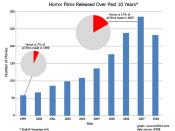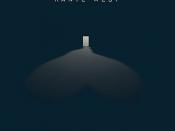Proposal and Procedure:
Most people remember, as children, having nightmares. In today's society, the abundance of scary movies and other media-related thrillers leads to long-term anxiety effects that, in the past, were relegated to children under twelve years of age. In a study by University of Michigan researcher Kristen Harrison, 26% of 150 college students report a "fright reaction" that continues into adulthood after viewing certain situations portrayed in movies. In some cases, the reaction involves sleep interruption for months. Such interruptions occur during REM sleep when dreams become nightmares. Nightmares are due to anxiety-related feelings brought on by stress from various sources. However, according to Wayne Weiten, "persistent nightmares may reflect an emotional disturbance" (194). He goes on to say that nightmares may be the result of stress in one's life or "neurotic tendencies." Sometimes treatment is necessary to overcome having nightmares. Consequently, some people who experience nightmares have pre-existing problems beyond the experience of watching a scary movie.
I hypothesize that scary movies do not give people nightmares, unless they are prone to them or are already easily scared.
To prove my hypothesis, a questionnaire (see attached) will be administered to a small group of my friends, thereby not needing consent from elected officials in our school district (Dr. Salem and etc.). I will question about 8 students in the age bracket of 16-18 years. The questions will be specifically geared toward finding out if the students currently experience nightmares and if they consider themselves easily scared. For those who answer in the positive regarding having nightmares and/or being easily scared, a section must be completed asking how often nightmares are experienced. This will establish a pattern of susceptibility toward sleep interruption that may be enhanced by watching scary movies. All participants will be asked if they frequent...



Felt like it lacked something
This paper is informative to the hypothesis, but the case study seemed to lack more information regarding nightmares. Viewing the questionnaire and allowing further research on this topic may be more helpful to gaining a better perspective of the hypothesis.
0 out of 0 people found this comment useful.